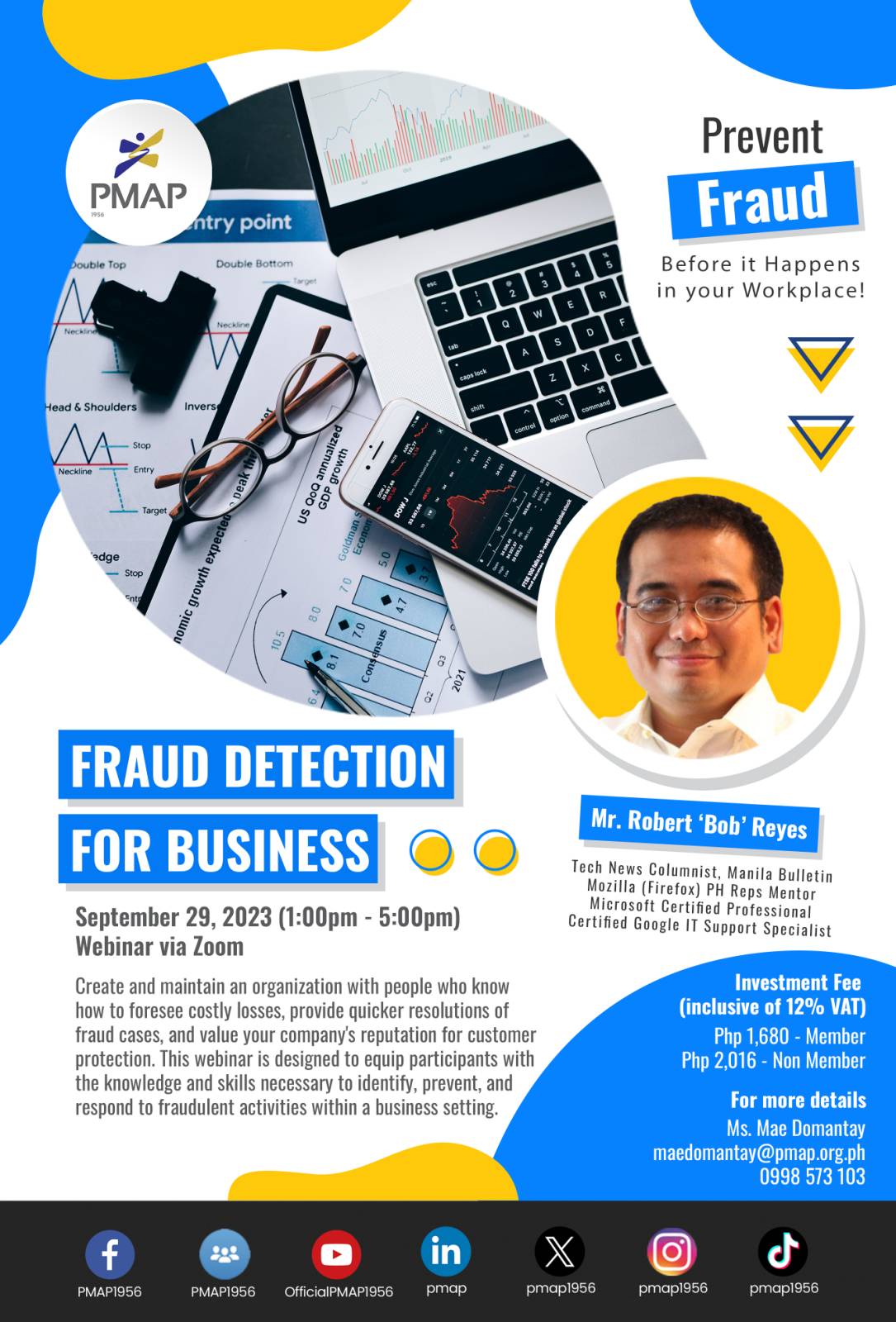Fraud Detection for Business

Event Date:
September 29, 2023
Event Time:
1:00 pm
Event Location:
Online via Zoom
Date: September 29, 2023 Time: 1:00 PM – 5:00 PM Venue: via Zoom Conference
Fee: Php 1,680.00 – Member Php 2,016.00 – Non Member
*Inclusive of 12% VAT
What is this webinar all about?
“Fraud Detection for Business” training is a comprehensive training designed to equip participants with the knowledge and skills necessary to identify, prevent, and respond to fraudulent activities within a business setting. The training focuses on understanding the nature of fraud, exploring the motivations behind fraudulent behavior, and recognizing the warning signs of fraud. Participants will learn how to establish a fraud prevention culture within their organizations by implementing strong ethical frameworks, developing anti-fraud policies, and promoting reporting mechanisms.
The training delves into the importance of implementing robust internal controls, including segregation of duties, authorization processes, and access controls, to mitigate the risk of fraud. It also covers the application of data analytics techniques, such as identifying anomalous patterns and leveraging predictive modeling, for effective fraud detection. Participants will gain insights into fraud detection tools, technologies, and software that can enhance their ability to detect and investigate fraudulent activities.
This training provides guidance on conducting fraud investigations, including gathering evidence, conducting interviews, and navigating legal considerations. Best practices for fraud prevention, such as continuous monitoring, employee education, and engaging external auditors, are emphasized to help participants develop a proactive approach to
mitigating fraud risks.
Throughout the training, real-life case studies and examples are used to illustrate key concepts and lessons learned from successful fraud detection efforts. The program also includes a Q&A session and discussion to address participant questions and facilitate knowledge sharing.
By the end of the “Fraud Detection for Business” training, participants will have a solid understanding of fraud detection principles, the ability to implement preventive measures, and the skills to respond effectively to fraudulent activities within their organizations. They will be equipped with practical tools, strategies, and best practices to strengthen their fraud detection capabilities and protect their businesses from financial losses and reputational damage.
Webinar Outline
1. Introduction to Fraud Detection
a. Definition of fraud
b. Importance of fraud detection for businesses
c. Overview of common types of business fraud
2. Understanding Fraudulent Behavior
a. Psychological factors behind the fraud
b. Motivations for committing fraud
c. Red flags and warning signs of fraudulent behavior
3. Establishing a Fraud Prevention Culture
a. Creating a strong ethical framework
b. Developing a code of conduct and anti-fraud policies
c. Promoting whistleblowing and reporting mechanisms
4. Implementing Internal Controls
a. Segregation of duties
b. Authorization and approval processes
c. Physical and logical access controls
d. Reconciliation and review procedures
5. Data Analytics for Fraud Detection
a. Overview of data analytics techniques
b. Identifying anomalous patterns and transactions
c. Using predictive modeling for fraud detection
d. Leveraging machine learning algorithms
6. Fraud Detection Tools and Technologies
a. Introduction to fraud detection software
b. Using data visualization tools for fraud analysis
c. Incorporating artificial intelligence in fraud detection systems
7. Investigating and Responding to Fraud
a. Establishing an effective fraud investigation process
b. Conducting interviews and gathering evidence
c. Legal Considerations in fraud cases
d. Reporting and taking corrective actions
8. Fraud Prevention Best Practices
a. Employee education and training
b. Continuous monitoring and auditing
c. Engaging external auditors and consultants
d. Keeping up with evolving fraud trends
9. Case Studies and Real-Life Examples
a. Analyzing actual fraud cases
b. Lessons learned from successful fraud detection efforts c. Identifying vulnerabilities and implementing preventive measures
10. Q&A Session and Discussion
a. Addressing participant questions and concerns
b. Sharing experiences and insights
c. Summarizing key takeaways and action points
Speaker

Mr. Robert ‘Bob’ Reyes
Tech News Columnist, Manila Bulletin
Mozilla (Firefox) PH Reps Mentor
Microsoft Certified Professional
Certified Google IT Support Specialist